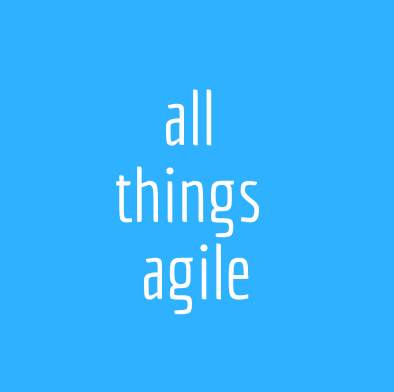
What are the roles and responsibilities of a Scrum Master? Let’s look at your dreams and wishes vs what companies are really asking for. You may be in for a surprise!
In today’s blog, we will look at a few job postings to discover what companies are really looking for when they say they want a scrum master. Then we will uncover the patterns across those postings, as well as a few lessons to take away.
If you’d rather watch a video than read, you can check out my Youtube video on this topic:
Scrum Master Job Postings
Let’s take a look at some postings. You can find them on all major job websites, but I found these on Indeed and Glassdoor.
Scrum Master/Product Owner
This first post pays relatively well and is in Montreal, where I am based. The experience they are looking for includes collaborating with stakeholders, understanding business problem statements, product vision and managing backlog of multiple products simultaneously.
What is really interesting about this job is that it feels like you’re expected to be more of a project manager and not required to work on developing teams at all. It seems that your responsibility is on the stakeholder and work management front. You would need a lot of product backlog techniques, but this isn’t usually the full scope that you would expect for a scrum master job.
What might be interesting about this job is that it allows you to grow a very particular set of skills in backlog and product management. Former Product managers and project managers might have an upper hand in this one.
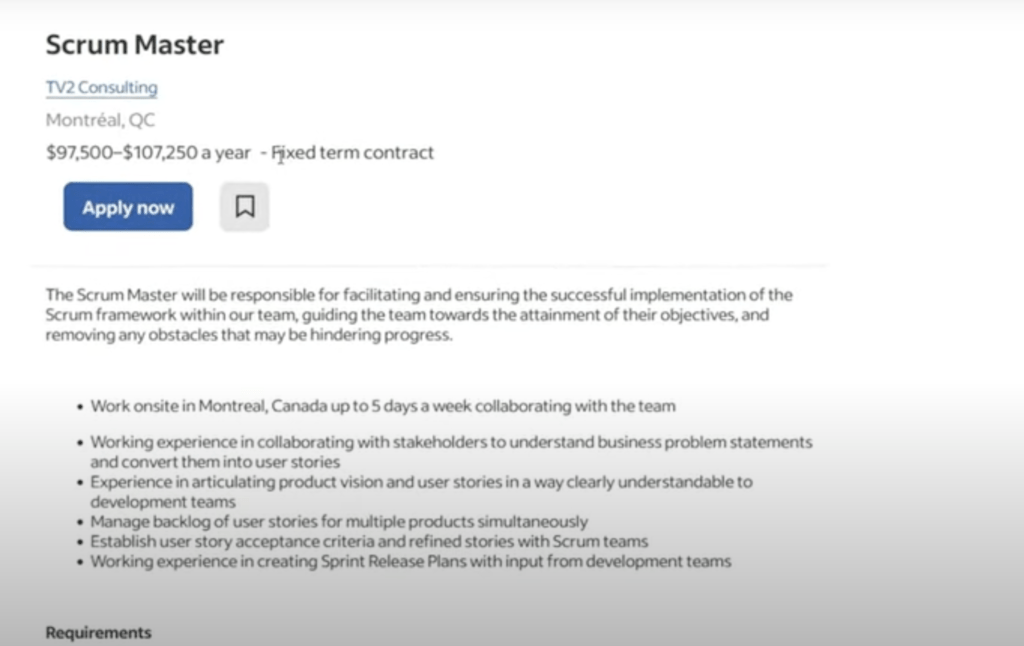
Generic
In another post, we have again a good hourly rate, a contract position in Montereal. In this one though, You start to see more fluff and generic statements/requirements. It’s not badly written, but “getting a team to a high performing level by recognizing areas of strength and improvement by employing appropriate coaching and development techniques” doesn’t really say much. The requirements as written are very nondescript. It’s hard to understand what the responsibilities of the day to day really are when they are so generic.
There is an opportunity here to make sure you are a good fit by asking what they mean by things like “cross-functionality” or “effectiveness of the application of scrum in the organization”. Am you dealing with one team? Many teams? You need to understand what you are committing to.
Note that in the qualifications they start asking for things like “highly able to prioritize” and “effectively manage multiple tasks” – asking for multitasking can be a red flag!
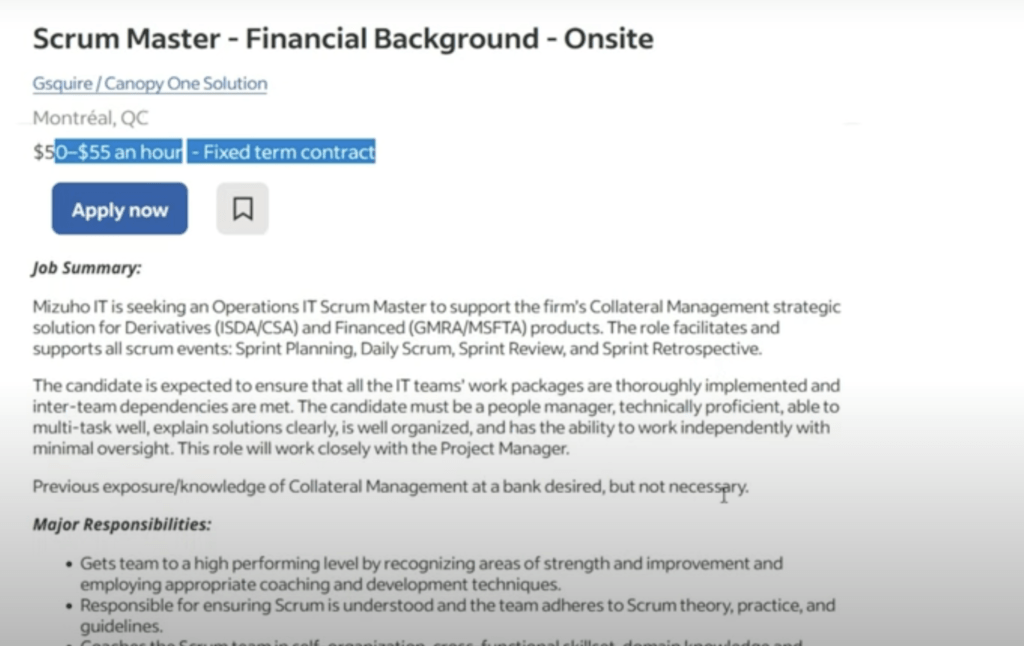
Scrum Master/Agile Coach
In another post we don’t know how much they pay, but we know they have plans for long term contract. This can mean an opportunity for growth. When we look at the details, we notice menton of transforming teams into the agile way of organizing and working. You see that they are transforming from waterfall, so you’ll be helping with that change in the status quo. Helping with mindset, removing blockers, and operating more as an agile coach. You’ll help with individuals and teams, and join forces with other scrum masters to facilitate improvement.
In qualifications, you start seeing that they will accept you even if you were not a scrum master before. They are really hiring based on experience. However, the knowledge that they ask for isn’t that simple. You’ll need to understand frameworks, tools, how to coach people, and collaboration techniques.
For this post, I would ask about the current state of things, especially when you see them talking about moving from point a to point b. You want to know what they mean by point b. Are you expected to be advocating for the initiative or is there someone else responsible for that? Because if you’re really hands on working with people, but also having to work with leadership teams on the forefront of the change, it’s a lot of work for one person.
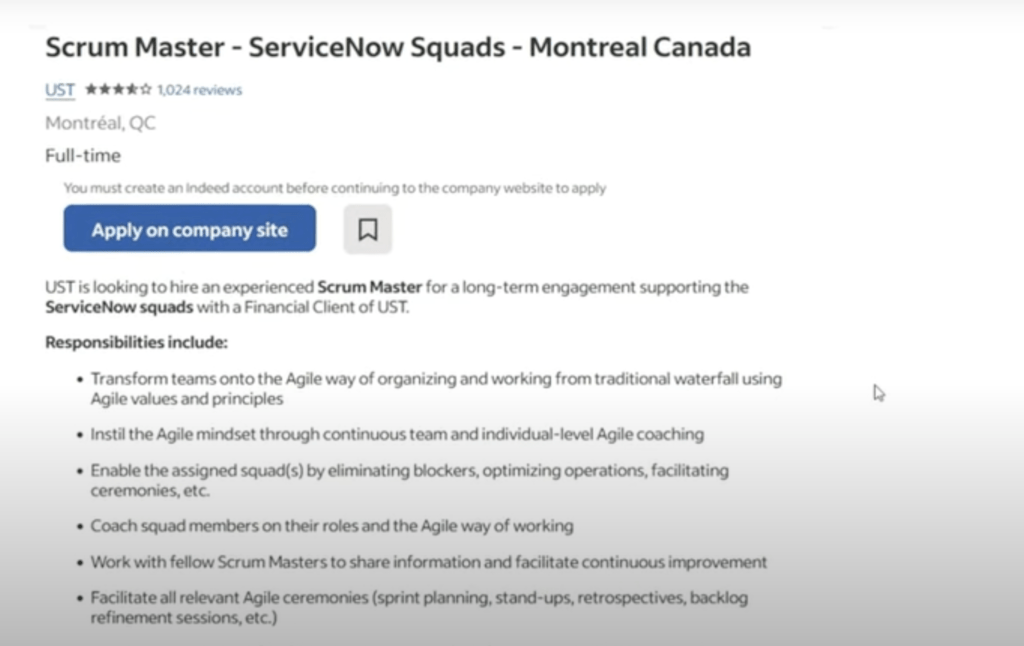
Technical Scrum Master
The next two posts are very similar and are more on the technical side of things, showing that you can be a technical scrum master. These are not opportunities that are for everyone. You have to have the technical understanding because you are going to be involved in the details of how people do things and the pipeline of development.
In this first post, it feels like they are looking for more of a production support manager. Someone who understands quality and production, deployment, but also Scrum, coaching, and can communicate well. There’s a lot of things being asked, but it’s nice that they relax on certifications and seem to be more interested in your experience. A Lot of people rush to get a certification in scrum because they think that’s all they need, but we see that’s not necessarily true.
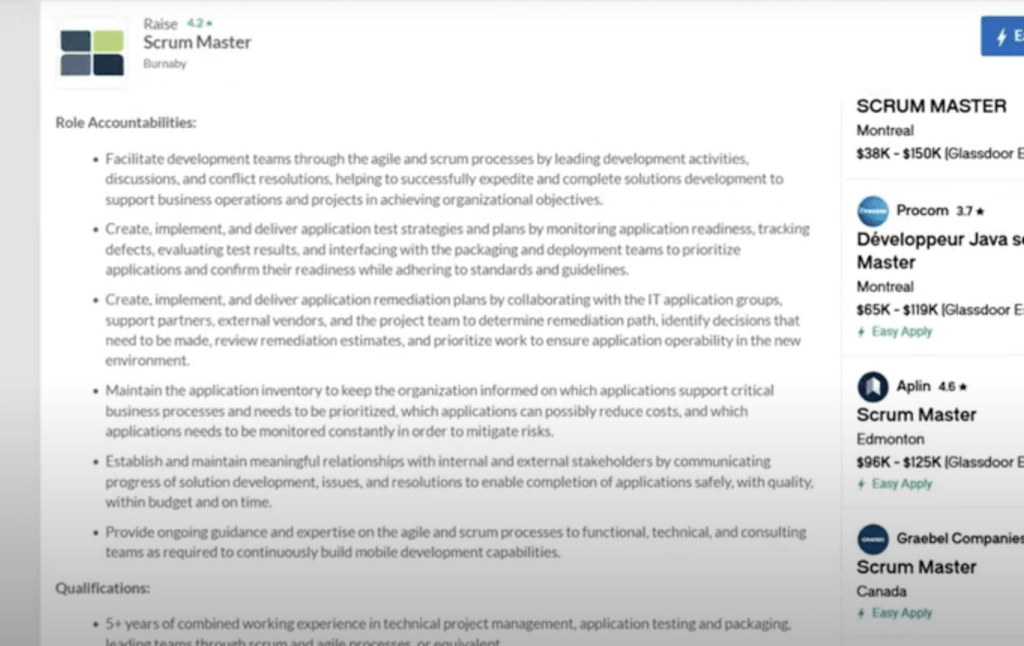
In the second post, they are really looking for a technical scrum master. Don’t even bother applying unless you really know your stuff. They are looking for knowledge in development for ARM and C++ on Linux, and knowledge of Python, making this definitely not for everybody. They are asking for you to be a scrum master and developer.
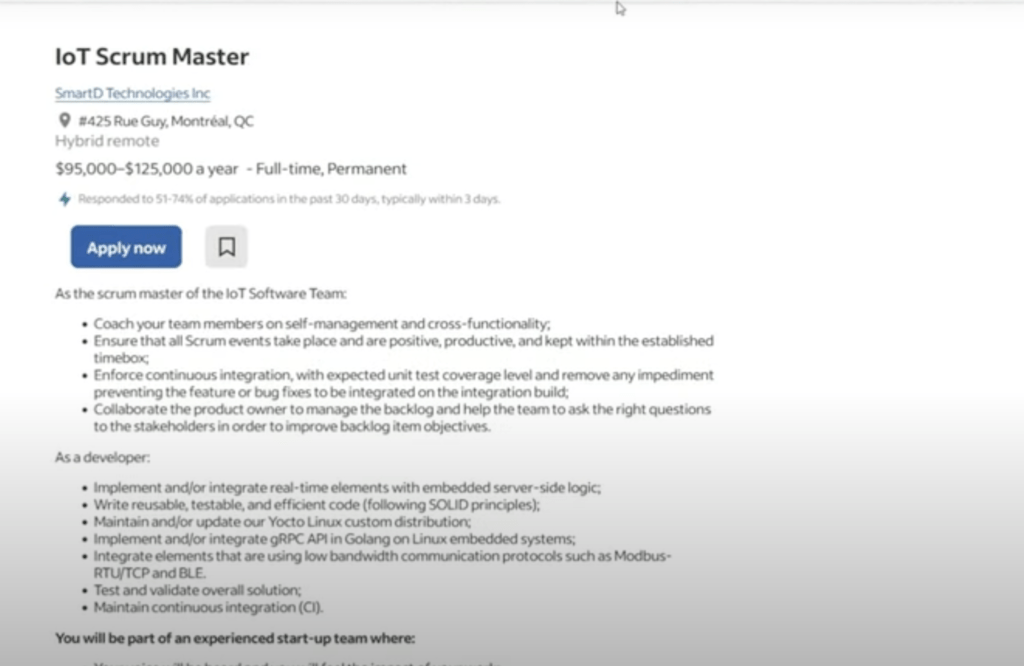
Before you cringe thinking you can’t be a scrum master and developer, yes you can. I’ve done it for a couple of years in the beginning of my career and in fact, it is helpful for understanding the pipeline of development and solving specific problems. An advantage is you can build a ton of trust with teams because you are one of them. You have the language and rapport. It’s also a great way for the organization to frame your fit.
A tip for applying for dual role positions like this is to notice things the maturity of the team. In this last post, the team is experienced so you won’t need to be holding their hand. But whenever you have a dual role, ask them if they understand the implications of sharing your time. Because sometimes you’ll have to be more involved in one role than the other.
Heavy Hitter Agile Coaches
The last two posts are the heavy hitters for very experienced coaches, consultants or project managers if you really read them.
They put a lot of emphasis on interpersonal skills. They aren’t talking about velocity and story points. They want a great facilitator, negotiator, and coach to guide people and create alignment. This isn’t your average, “I’m just beginning with agile” type of thing. Despite the scrum word you might find, they really are asking to have extensive lean agile knowledge. When they say for example “serve as a liaison between people” they are expecting something more interesting from you than the average “I read the scrum guide” type of thing.
As far as questions to ask, I would inquire why they consider understanding SAFe as an asset. Are they scaling? I would not accept generic answers here and try to understand what problem they are trying to solve with scaled agile approaches.
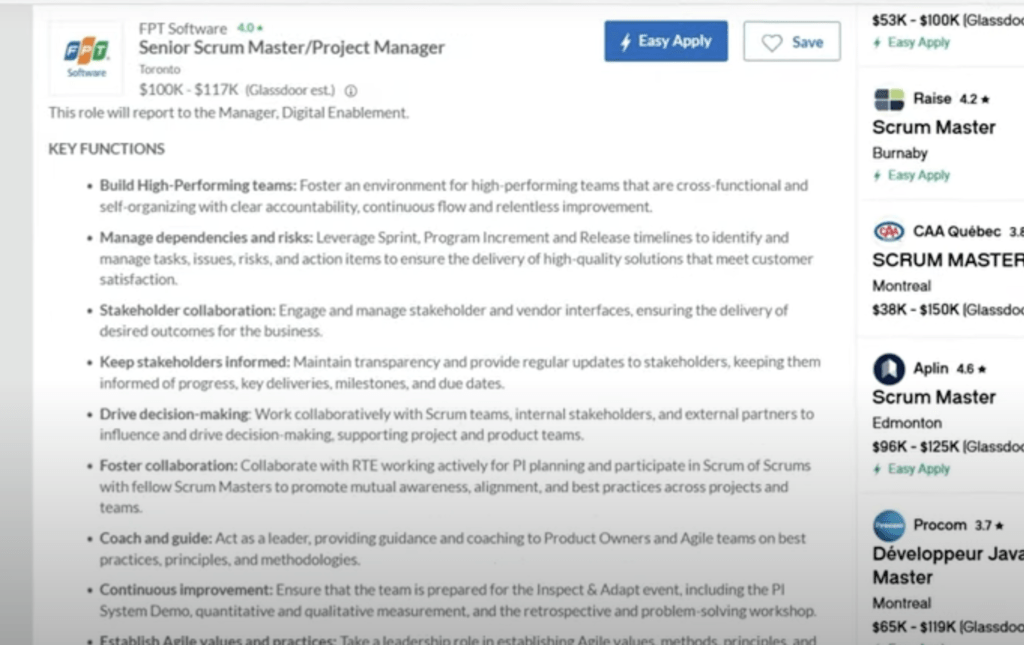
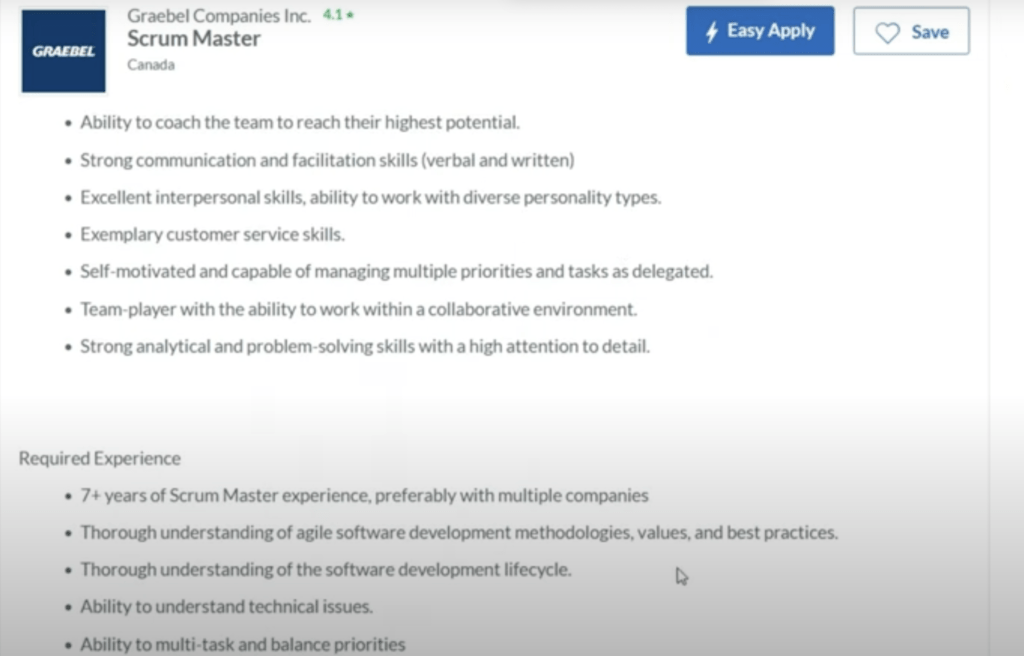
Patterns
There seemed to be a few patterns across the job descriptions we looked at:
- Adapt agile: the ability to create something using best practices and adapting existing methodologies
- Partnering: the ability to partner with leaders and proactively manage and identify and solve issues
- Coaching: the ability to coach teams and people to reach their potential
- Planning and management: the ability to manage a backlog, delivery, production, performance, capacity, and risks
- Liaison: the ability to communicate with other teams, senior stakeholders, product managers and other departments
- Tooling: knowledge of programs like Gira and Azure DevOps, frameworks like Scrum and SAFe, and Agile in general and in practice
- Hands-on: ability to manage problems, track the progress, and support the people in the application of practices
Tough Lessons
As you saw, the posts were all very different! And this wasn’t surprising to me. It’s something that I have experienced in my career coaching other people to become team and organizational coaches.
First of all, scrum master is not and never was a beginner position. You were always required to show proof of your abilities. In the beginning, many scrum masters are all about running the next cool retrospective and that couldn’t be further from what is required. It’s probably the least of your troubles when you’re really trying to help teams be effective and organizations make a shift in the way they work.
Secondly, it doesn’t matter what you want the scrum master role to be. It doesn’t matter what is written in the scrum guide or what your personal aspirations are. What matters is what companies need, what they are looking for, and what they are willing to pay. You saw that the scrum master descriptions range from a fantastically skilled product manager to a full blown agile coach/consultant. Many were contractor positions so you should be able to solve the issue and be ejected. The salary is usually good, but the company won’t pay it if you’re unable to solve their problems. They are not looking for a beginner.
So, what do you do if you’re a beginner or aspiring scrum master? Give up now? No way!
- Study: gain the knowledge required. These are competency based roles. Get into courses and join a community of practice. I offer both paid courses and free masterclasses, q&as, and webinars. Join for free!
- Apply: you don’t need the title to use the required skills. Start where you are as an agile practitioner and coach. Help your own team, a colleague, or a team in another department. Go after those that are interested in learning with you or from you. Start by affinity.
- Network: A lot of great positions are filled internally or by reference. You want to be in the loop and connected.
Thirdly, even though it feels like tough love, you are dealing with a lot of competition. There is a lot of hiring in agile coaching, scrum mastering, agility enabling professions, yet there are a lot of people competing as well. There are people with a lot of experience so you want to make sure you are in this race for the right reasons.
Consider why you really want to become a scrum master. Is it status or money? You can get those in other places. So, get that really straight in your head and connect deeply with the motivation. One that will help you go far is a deep desire to make a difference in the lives of people and how organizations work. You like helping people reach their next best level. It’s also what organizations want and need.
Know that there is a lot of study and applied study ahead of you. Every year I do a lot of paid courses, coaching with other coaches, am in a community of practices, and receive coaching myself. You are in for continuously spending money and time in pursuit of excellence. You can’t expect anything else in this career.
That being said, it is a very rewarding and fulfilling career path. It is very dynamic and you grow so much as a person and help so many people along the way.
If you are interested in learning about how to coach for team development and success, check out my Agile Coaching Program! It’s a month-long course of learning by doing! We have recently amped up the conflict navigation, team development, and agile principles in practice areas of the course so it is truly better than ever. In addition, we are proud partners with ICAgile so you will receive a highly recognized certification upon completion that will set you up well for a career as an agile coach.
